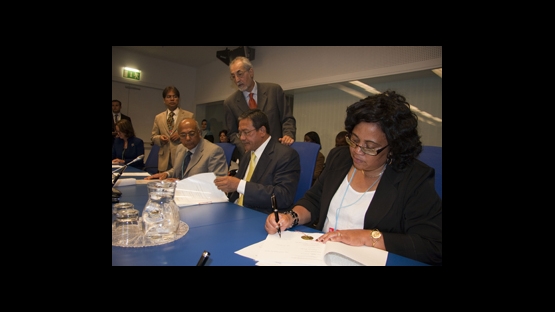India donated a radiotherapy machine to Namibia, the third in a series of donations to developing nations, to support the country in fighting the cancer epidemic affecting its population. The Bhabhatron-II radiotherapy unit, to be donated to Namibia under the IAEA's Programme for Action for Cancer Therapy (PACT), is due to be installed at the Oshakati State Hospital.
Until now, Namibia had only a single radiotherapy unit to treat a population of 2.2. million people. It is located in Windhoek, more than 700 kilometres distant from Oshakati. India's donation doubles the nation's radiotherapy capabilities.
A trilateral process, involving the donor, India, the recipient country, Namibia and the IAEA, commenced when the donation agreement was signed on 22 September 2011 during the IAEA's Fifty-fifth General Conference.
Bringing Relief
"I believe we have laid the ground work for a fruitful cooperative arrangement between the three parties and I am confident that we can deliver on our collective aspiration, which is to bring relief, renewed strength and good health to our people in northern Namibia," said Petrina Haingura, Deputy Minister of Health and Social Services Republic of Namibia.
"I would like to extend our appreciation on behalf of the Government of the Republic of Namibia for this noble contribution made by the Government of India," she added. "We also thank the IAEA and in particular the PACT Programme Office for facilitating this collaboration."
This is the third radiotherapy unit to be donated by India through the IAEA's PACT programme since April 2010, the first unit was successfully delivered to Vietnam and the second unit will be soon installed in Sri Lanka.
Tangible Results
"Right from the inception of PACT we have been closely cooperating with the IAEA on an on-going programme supporting developing countries," said Shri Dinkar Khullar, Ambassador of India to Austria, Permanent Representative of India to UN Offices and International Organisations in Vienna and Governor for India on the IAEA Board.
"So far, we are happy that the process is working and in fact the one great advantage is that it is yielding tangible results in the countries," he emphasized. "We would be happy to make further donations in cooperation with the IAEA as part of the PACT programme," he added.
"There has been interest from certain counties mentioned to us so that cooperation is going on and we would be willing to go further in this regard, to other countries in Africa or Asia which require it."
Background
Launched in 2004, PACT is an IAEA initiative in response to the developing world's growing cancer crisis, with the overall goal of raising cancer awareness, assessing needs, developing demonstration projects and attracting donours.
PACT includes a joint programme with the World Health Organization (WHO), allowing cooperation with other health organizations, and aimed at the design and implementation of comprehensive cancer control programmes in the developing world.


